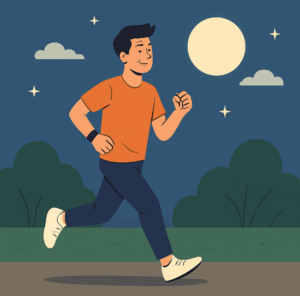Exercise and Insomnia: How Moving Your Body Can Improve Your Sleep
 Introduction
Introduction
Insomnia — the persistent difficulty in falling asleep, staying asleep, or waking up too early — affects millions worldwide. While medications and therapy have their place, one of the most accessible, non-pharmacological remedies is often overlooked: Exercise.
How Exercise Helps Improve Sleep
-
Regulates the Body Clock (Circadian Rhythm)
-
Regular exercise helps reset your biological clock, promoting more stable sleep-wake cycles.
-
Morning and afternoon workouts especially help align your body’s natural rhythm.
-
-
Reduces Stress and Anxiety
-
Physical activity lowers cortisol (the stress hormone) and boosts endorphins, making it easier to relax before bed.
-
-
Increases Sleep Drive
-
Moderate-intensity exercise increases the body’s need for recovery, thereby enhancing homeostatic sleep pressure — your brain’s natural desire for restorative sleep.
-
-
Improves Mood and Energy Balance
-
Exercise improves mood and energy regulation, which reduces the mental hyperarousal commonly seen in insomnia.
-
Best Types of Exercise for Sleep
| Type of Exercise | Recommended Timing | Why it Helps |
|---|---|---|
| Aerobic (Walking, Jogging, Swimming) | Morning or Afternoon | Stabilizes body clock, reduces anxiety. |
| Strength Training (Weights, Bodyweight Exercises) | Earlier in the day preferred | Improves overall fatigue, helps metabolism. |
| Yoga / Stretching | Evening or Night | Calms the nervous system, reduces tension. |
Practical Tips
-
Avoid intense workouts 1-2 hours before bedtime, as they can temporarily increase heart rate and body temperature.
-
Aim for 150 minutes per week of moderate aerobic activity, as per WHO guidelines.
-
Incorporate mind-body exercises like yoga if your insomnia is stress-related.
Caution
If you have chronic insomnia, consult a doctor. While exercise is beneficial, it should be part of a comprehensive plan that may include Cognitive Behavioral Therapy for Insomnia (CBT-I) and lifestyle changes.
Conclusion
Exercise is not a quick fix, but when practiced consistently, it plays a powerful role in improving sleep quality. Think of it not as punishment for your body but as preparation for better sleep.